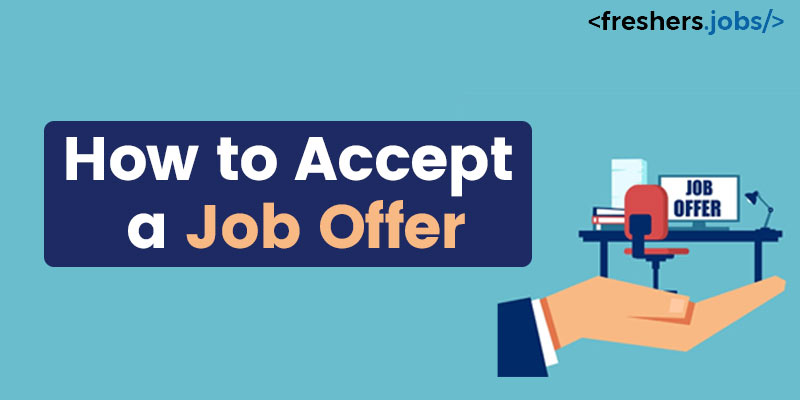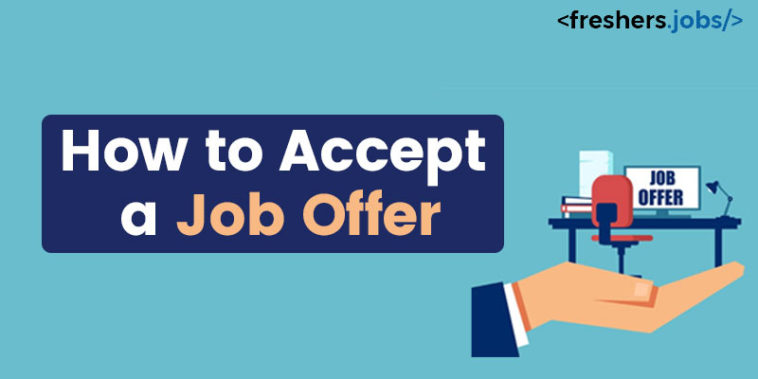When you obtain a job offer, you should know the procedures before accepting it. Knowing how to handle each stage of the job offer procedure will ensure you get the best freshers jobs position with the best conditions. You should include a few things in your acceptance of offer letter to show you are professional and excited about your upcoming job.

This blog examines the phases of a job offer, how to take it, and make you appear competent.
Stages of a Job Offer
Before accepting an employment offer, you should know the various stages. Knowing what to expect when getting a job offer will help you prepare for negotiations while maintaining a professional demeanor. Additionally, it will clarify when you can start negotiating for pay without feeling anxiety about a new job. The various phases of an employment offer are as follows:
- Verbal offer
- Written offer
- Negotiate the offer
- Accept the offer
Verbal Offer
After a successful interview, the HR manager will likely contact you with a verbal offer before sending the formal contract. Depending on who you have been speaking with, the hiring boss or an HR representative will contact you to make the offer. Thus you must know how to accept offer letter and the effective tips for verbal communication.
Even though some hiring managers make an offer after the interview, you will probably get a call a few days later. Feel free to express any immediate questions after receiving a verbal request. Asking about the pay and start date at this point might be a good idea. To ensure you receive prompt responses and to aid in negotiations, prepare your questions in preparation.
Feel free to express your excitement throughout the discussion. The Recruiters want to know that you are enthusiastic about the job position in addition to just taking it. This helps you create a positive impression before you even start a job.
A verbal proposition does not have to be accepted right away. Thank the recruiting manager or HR representative for the offer, then ask when you can expect a written contract or offer. You can inform them if you are interviewing for other positions, which might facilitate future talks. Most hiring managers will give you at least a day and sometimes up to a week to consider all of the offer’s terms for acceptance letter, particularly if you need to consider other job offers. You can check out the ways to follow up after a job interview.
Written Offer
Following the verbal offer from the hiring manager, you will receive a more official written offer, typically via email. The following details should be included in a written employment offer:
- Job title
- Salary
- Start date
- Benefits package
Make sure everything you talked about or anticipated based on the interview process is accurate by reviewing the data.
Usually only one or two pages long, a written employment offer will have a space for your signature. Do not sign or return your offer and acceptance until you have read the entire document and accepted its terms. If you already have a job, ensure the start date allows you enough time to give your present employer at least two weeks’ notice. Doing so is a sign of professionalism. Know how to write a professional email.
Negotiate the Offer
Call or email the hiring manager or HR representative if you were expecting a higher freshers salary, additional benefits or a different start date. It is a standard component of the hiring process for companies to expect you to haggle over some contract terms.
It is crucial to study before negotiating any aspect of your offer. Look up the local average pay for the position in question and consider your present salary. You can justify a higher salary during the negotiation if your experience or abilities merit it.
One negotiating strategy is to demand more money than you want, then justify it by citing factors like your college or work experience. You would profit if the hiring manager accepted it, but they might also give you a rate within your desired range. If the employer is unwilling to compromise on your pay, ask if there are any other benefits they can provide, such as more vacation time or other factors that are essential to you.
The company may only sometimes be able to bargain because of financial limitations or other issues in the job acceptance letter. You can choose to take or reject the offer letter in this situation. It can be helpful to visualize your potential job path within the organisation. You might want to accept the offer if you have a lot of space for professional and career development.
Accept the Offer
Sign the offer when prepared, then return it to the recruiting manager. If you negotiated any contract provisions, get a new offer letter representing the changes. You will typically receive the letter as an email attachment that you can electronically sign or print out, physically sign, scan, and return. Maintain a signed duplicate for your records.
How to accept your Job Offer Letter through Email
Writing a clear, concise, and professional email to accept a job offer is essential to set a good tone for your work with the company. Here are the different steps and tips you can take to write a job offer acceptance mail:
Create a Clear Subject Line
The subject line of your acceptance email should be short and explain why you are writing. “Accepting [Company Name’s] Offer—[Your Name]” is a simple subject line. This short line tells the person getting your message what it’s about and who sent it. Hence you must know how to write a subject line.
Send the letter to the Right Person or People
You should always write a letter to the person who sent you the offer letter. If you got your acceptance letter by email, all you have to do to say yes is the reply to the email.
Thank the Person who sent the Offer
In an acceptance letter, you can thank the employer for allowing you to work for the company and for interviewing you. Think of the acceptance letter as another way to show appreciation and excitement about the job.
Accept the list and the terms of the Job
An acceptance email should be short and to the point, but it can be helpful to list the terms of employment that you and your company have agreed to. You can accept the pay, benefits, paid time off, and start date.
Fill out the Email
Add a short signature to your acceptance of offer letter. Again, thank the employer for the chance, and then sign your name. To do so, write an email to the hiring manager professionally.
Conclusion
I hope you are clear from the blog on How to accept a job offer. Your next move after receiving an employment offer is to take it with a letter or email politely. You can show off your professionalism and order by communicating with the company. This will indulge your career advancement, land more jobs alert and boost your confidence for the acceptance letter.



